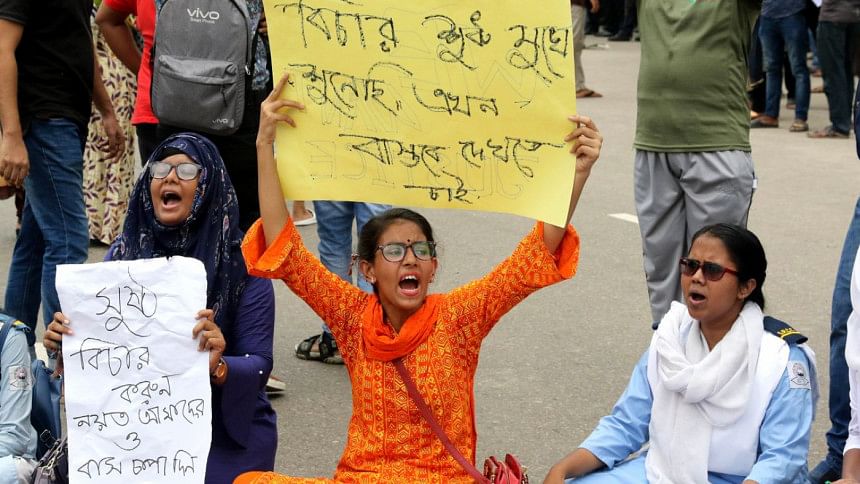Road safety movement: Four years on, road fatalities keep rising

Four years ago today, two students were killed when a bus, competing with another to get passengers, ploughed into a crowd.
The senseless deaths of Dia Khanam Mim and Abdul Karim Rajib, of Shaheed Ramiz Uddin Cantonment College, sparked unprecedented protests in the capital and across the country as students of schools, colleges and universities took to the streets, some attempting to enforce traffic laws that were routinely violated in the presence of police.
The protests moved the authorities into some action. A Road Transport Act was hastily passed in parliament that provided for more stringent punishments for traffic law violations, the PMO issued 17 directives. The following year, a high-powered taskforce headed by the home minister was formed to curb road crashes and deaths.
But as friends and families observe the fourth death anniversaryof Dia and Rajib today, their deaths, those protests which also saw law enforcers take action on students, and the authorities' subsequent promises and recommendations, appear to have come to little avail.
In the intervening years, road safety has only worsened as, according to police records, the number of deaths from road crashes in 2021 was nearly twice that of 2018. According to road safety organisations, the numbers could be much higher than reported.
"Road accidents remain a problem," Jahangir Fakir, father of Dia, told The Daily Star yesterday.
"Thousands of students took to the street after the death of my daughter. they staged movements, faced cases. I want the number of road crashes to come down," he said.
Prof Hadiuzzman, the director of Accident Research Institute (ARI) of Buet, said authorities have placed more emphasis on infrastructure development for increasing speed without eliminating factors that make roads risky.
He mentioned unfit and illegal vehicles and unlicensed drivers as the risk factors, and that the numbers of such vehicles and drivers have increased in the last few years.Instead of the Road Transport Act which was passed in September 2018 and partially came into effect in November 2019, more emphasis was given on the 111 recommendations made by a committee led by former minister and transport leader Shajahan Khan in April 2019, said Hadiuzzaman.
But reducing road crashes is not possible without proper implementation of the law, he said.
Several sections of the act still remained unimplemented due to pressure from the transport associations and absence of rules, which were not framed in the last four years, road transport and bridges ministry sources said.
A taskforce led by Home Minister Asaduzzaman Khan was formed in October 2019 to implement the 111 recommendations, but as of Wednesday, it held five meetings but could make little progress in their task.
Among the PMO's 17 directives on August 16, 2018, was an order for buses to pick up and drop off passengers only at designated spots and to keep doors of running buses shut at all times. These orders continue to be flouted.
Contacted, Road Transport and Highway Division Secretary ABM Amin Ullah Nuri said the government is working to reduce road crashes but it is the people who have to be aware.
"We have to make people aware. We have to encourage them to practise road safety. Everything is not possible by enforcing law," he told The Daily Star last night.
"Whenever we go for evicting three-wheelers from highways, you [journalists] write against it, bringing up humanitarian issues."
On Tuesday, Bangladesh Road Transport Authority on Tuesday wrote to all deputy commissioners to conduct mobile courts, apart from their usual drives, at least one day a month for reducing road crashes.
ONLY GETTING WORSE
Transport expert Prof Moazzem Hossain told this newspaper yesterday that a sharp rise in crashes involving motorcycles and three-wheelers have played a big part in the deterioration in road safety.
Prof Moazzem, a former director of ARI, said they have been talking about the risks involving bikes, terming them as "ticking time bombs" for the last few years, but it has gone unheeded.
He said the deterioration of the public transport system in the last few years compelled people to go for unsafe vehicles like bikes and three-wheelers, increasing the number of crashes.
"So, the worst is yet to come," he said.
At least 2,635 people were killed in 2,609 road crashes in 2018 – the year of the protests. According to police reports, in 2021 deaths have nearly doubled to 5,084 in 5,472 road crashes.
In 2019, 4,138 people were killed in 4,147 crashes, while 3,918 people were killed in 4,198 crashes in 2020, according to police reports.
In the first five months of this year, at least 2,023 people were killed in 2,384 road crashes.
However, different road safety organisations that keep track of crashes put the numbers much higher.
According to Bangladesh Jatri Kalyan Samity, at least 7,809 people were killed in 5,629 road crashes last year.

 For all latest news, follow The Daily Star's Google News channel.
For all latest news, follow The Daily Star's Google News channel. 








Comments